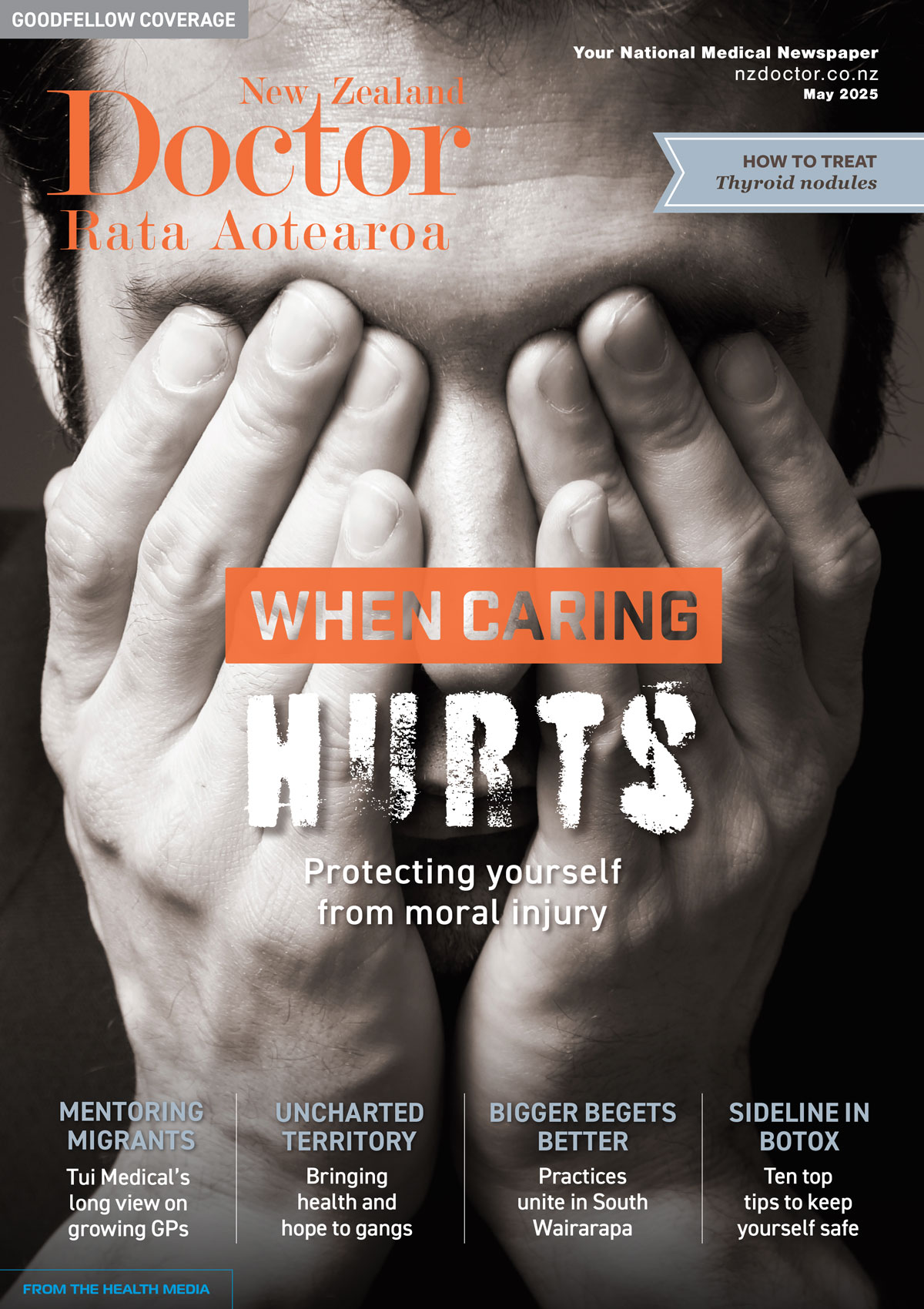Otolaryngologist, head and neck surgeon Francis T. Hall discusses the evaluation of thyroid nodules, which primarily aims to determine the likelihood of malignancy. He then reviews the treatment of thyroid nodules and thyroid cancer, including recent advances in management
Health sector not ready to provide best practice abortion care
Health sector not ready to provide best practice abortion care

Aotearoa achieved a major milestone in sexual and reproductive health and rights with the decriminalisation of abortion, but a University of Otago academic argues abortion care is still not being provided within the full extent of the law.
Emma Macfarlane, a Lecturer in the Department of Women's and Children's Health, believes little has changed in the way abortion services are organised in the year since the Abortion Legislation Act 2020 came in. She also argues we are yet to realise the full extent of abortion care within a decriminalised environment.
“Abortion services are still operating under the interim abortion standards, which need to be extensively revised to reflect best practice abortion care that could be provided under the new legislation,” she says.
In an opinion piece published in today’s New Zealand Medical Journal, she outlines how abortion care could, and should, be provided within primary care to improve access and health outcomes for people with an unintended pregnancy.
“The Abortion Legislation Act 2020 provides scope for abortion care to be provided differently, with the potential to simplify the process and, importantly, to decrease inequities that exist in the provision of abortion care. One of the ways to achieve both of these goals is to place first trimester abortion care within the primary care sector,” she says.
“However, the health sector is not yet ready to provide best practice abortion care within the new legislative framework, with issues relating to funding, training, and access to medications yet to be resolved.”
Ms Macfarlane believes training for health practitioners is needed in order to provide safe abortion care in the community.
“Without adequate and appropriate funding for primary care workers, including midwives, nurses and nurse practitioners, there will be no incentive to undertake the training, nor the provision of abortion care so access to safe abortion will not be improved,” she says.
Also key is access to funded drugs, mifepristone and misoprostol, by a wider range of qualified health practitioners.
“The World Health Organisation advocates the shifting and sharing of abortion care from specialist providers to mid-level providers, such as registered nurses, nurse practitioners and midwives, to increase access to abortion, and reduce the burden of cost on the health care system.”
In the future, Ms Macfarlane says she would like to see abortion care treated like any other health care procedure.
“I hope for a future where abortion is not stigmatised and that a pregnant person can choose to have an abortion without fear of judgment. I would like health practitioners to be able to provide abortion care in the same way that they approach providing contraception, management of miscarriage, depression, or a heart condition.
“Abortion care should be part of a health practitioner's repertoire of skills and first-trimester abortion care integrated into primary care is a good place to start.”
*This article will form a chapter in Ms Macfarlane’s PhD. The aim of the PhD is to develop a framework for how best practice abortion care can be optimally provided in primary care.




![Barbara Fountain, editor of New Zealand Doctor Rata Aotearoa, and Paul Hutchison, GP and senior medical clinician at Tāmaki Health [Image: Simon Maude]](/sites/default/files/styles/thumbnail_cropped_100/public/2025-03/Barbara%20Fountain%2C%20editor%20of%20New%20Zealand%20Doctor%20Rata%20Aotearoa%2C%20and%20Paul%20Hutchison%2C%20GP%20and%20senior%20medical%20clinician%20at%20T%C4%81maki%20Health%20CR%20Simon%20Maude.jpg?itok=-HbQ1EYA)
![Lori Peters, NP and advanced health improvement practitioner at Mahitahi Hauora, and Jasper Nacilla, NP at The Terrace Medical Centre in Wellington [Image: Simon Maude]](/sites/default/files/styles/thumbnail_cropped_100/public/2025-03/2.%20Lori%20Peters%2C%20NP%20and%20advanced%20HIP%20at%20Mahitahi%20Hauora%2C%20and%20Jasper%20Nacilla%2C%20NP%20at%20The%20Terrace%20Medical%20Centre%20in%20Wellington%20CR%20Simon%20Maude.jpg?itok=sUfbsSF1)
![Ministry of Social Development health and disability coordinator Liz Williams, regional health advisors Mary Mojel and Larah Takarangi, and health and disability coordinators Rebecca Staunton and Myint Than Htut [Image: Simon Maude]](/sites/default/files/styles/thumbnail_cropped_100/public/2025-03/3.%20Ministry%20of%20Social%20Development%27s%20Liz%20Williams%2C%20Mary%20Mojel%2C%20Larah%20Takarangi%2C%20Rebecca%20Staunton%20and%20Myint%20Than%20Htut%20CR%20Simon%20Maude.jpg?itok=9ceOujzC)
![Locum GP Helen Fisher, with Te Kuiti Medical Centre NP Bridget Woodney [Image: Simon Maude]](/sites/default/files/styles/thumbnail_cropped_100/public/2025-03/4.%20Locum%20GP%20Helen%20Fisher%2C%20with%20Te%20Kuiti%20Medical%20Centre%20NP%20Bridget%20Woodney%20CR%20Simon%20Maude.jpg?itok=TJeODetm)
![Ruby Faulkner, GPEP2, with David Small, GPEP3 from The Doctors Greenmeadows in Napier [Image: Simon Maude]](/sites/default/files/styles/thumbnail_cropped_100/public/2025-03/5.%20Ruby%20Faulkner%2C%20GPEP2%2C%20with%20David%20Small%2C%20GPEP3%20from%20The%20Doctors%20Greenmeadows%20in%20Napier%20CR%20Simon%20Maude.jpg?itok=B0u4wsIs)
![Rochelle Langton and Libby Thomas, marketing advisors at the Medical Protection Society [Image: Simon Maude]](/sites/default/files/styles/thumbnail_cropped_100/public/2025-03/6.%20Rochelle%20Langton%20and%20Libby%20Thomas%2C%20marketing%20advisors%20at%20the%20Medical%20Protection%20Society%20CR%20Simon%20Maude.jpg?itok=r52_Cf74)
![Specialist GP Lucy Gibberd, medical advisor at MPS, and Zara Bolam, urgent-care specialist at The Nest Health Centre in Inglewood [Image: Simon Maude]](/sites/default/files/styles/thumbnail_cropped_100/public/2025-03/7.%20Specialist%20GP%20Lucy%20Gibberd%2C%20medical%20advisor%20at%20MPS%2C%20and%20Zara%20Bolam%2C%20urgent-care%20specialist%20at%20The%20Nest%20Health%20Centre%20in%20Inglewood%20CR%20Simon%20Maude.jpg?itok=z8eVoBU3)
![Olivia Blackmore and Trudee Sharp, NPs at Gore Health Centre, and Gaylene Hastie, NP at Queenstown Medical Centre [Image: Simon Maude]](/sites/default/files/styles/thumbnail_cropped_100/public/2025-03/8.%20Olivia%20Blackmore%20and%20Trudee%20Sharp%2C%20NPs%20at%20Gore%20Health%20Centre%2C%20and%20Gaylene%20Hastie%2C%20NP%20at%20Queenstown%20Medical%20Centre%20CR%20Simon%20Maude.jpg?itok=Z6u9d0XH)
![Mary Toloa, specialist GP at Porirua and Union Community Health Service in Wellington, Mara Coler, clinical pharmacist at Tū Ora Compass Health, and Bhavna Mistry, specialist GP at Porirua and Union Community Health Service [Image: Simon Maude]](/sites/default/files/styles/thumbnail_cropped_100/public/2025-03/9.%20Mary%20Toloa%2C%20Porirua%20and%20Union%20Community%20Health%20Service%20in%20Wellington%2C%20Mara%20Coler%2C%20T%C5%AB%20Ora%20Compass%20Health%2C%20and%20Bhavna%20Mistry%2C%20PUCHS%20CR%20Simon%20Maude.jpg?itok=kpChr0cc)